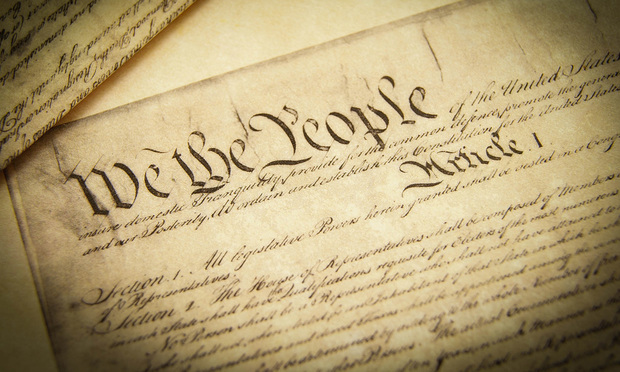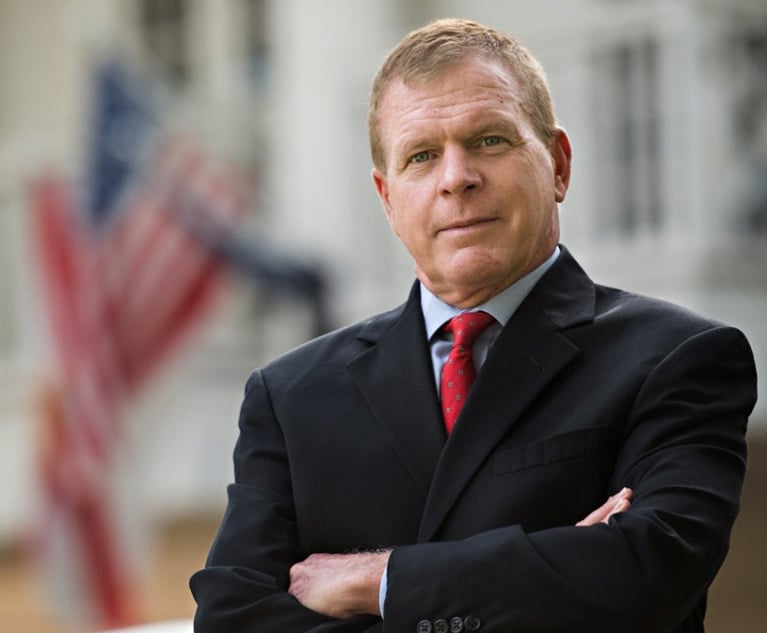Impeachment Is a Political Process, Not a Judicial One
Each act that a president takes provides him some political gain. But 'How much is too much?' is a quintessentially political question.
December 10, 2019 at 12:46 PM
4 minute read

In the current debate over the potential impeachment of President Donald Trump, there is much discussion of the impeachment proceedings regarding former President Richard Nixon. However, in many respects, there is another Nixon impeachment proceeding—that of Walter Nixon Jr.—that is at least as relevant and responds to many of the due process objections that Trump's counsel and other defenders have been raising.
Walter Nixon Jr. was a federal judge in Mississippi who used his influence to quash a state court criminal prosecution of the son of a close friend, and then lied under oath on several occasions about it. He was convicted and sent to prison, but refused to resign his judgeship and continued to be paid while behind bars. The House of Representatives impeached him and the Senate tried him, using live witnesses who were heard only by those senators on the committee specially appointed for that purpose. A full transcript was made available, and the Senate voted by a margin well above two-thirds needed to convict.
Nixon then went to federal court seeking to overturn his conviction on the grounds that the Constitution requires that the Senate "try" him, which he argued required that all 100 senators hear all of the testimony, just as the jury did in his criminal case. What is significant is not that Nixon got no votes when his case reached the Supreme Court, but that the court held that the meaning of "try" was a non-justiciable political question, which meant that the Senate alone could decide how to try an individual who had been impeached by the House. In reaching that conclusion, Chief Justice William Rehnquist's opinion relied mainly on the word "sole" in Article I, Section 5, clause 6: "The Senate shall have the sole power to try all Impeachments." The court was quite clear that the Framers left no room for the courts to intervene and that the accused's protections were to be found in the dual responsibility of the House to vote to impeach and the requirement that the Senate convict only if two-thirds of the senators present agree.
Indeed, the conclusion that the House may decide for itself how it wants to conduct its impeachment inquiry is informed by the same word "sole" in Article I, Section 2, clause 5, which gives it "the sole power of impeachment" and by Article I, Section 5, clause 2, under which "Each House may determine the rules of its proceedings." If anything, the House has more freedom to conduct its investigations, and file charges, than does the Senate its trial, because it is only the Senate that can remove someone from office. Even in the criminal context, grand juries are free to disregard protections that are guaranteed at trials, which underscores the freedom that the House has to structure its proceedings as it chooses.
There is another important aspect of impeachment that underscores its political, and not judicial, nature. Although an impeachment may be based on conduct that is a violation of the criminal law, everyone agrees that other acts, such as the abuse of the Office of the President for personal political benefit of the kind that was laid out before the House Intelligence Committee, can also be the basis of impeachment. Every president will exercise the powers of the office and, in some sense, every act that a president takes, from signing a tax reduction bill into law, appointing a Supreme Court justice or ordering a wall built on the border, provides the president some political gain. But, "How much is too much?" and "What aspects are legitimate?" are quintessentially political questions, which is why the Constitution assigns to our two nationally elected bodies—the House and the Senate—the powers to vote to impeach and to try any articles of impeachment that have approved.
The fact that impeachment is a political, not a judicial, process does not mean that basic elements of due process are abandoned. Members of Congress will be graded by their constituents not only on how they vote, but on whether they are treating the president fairly, which means giving him and his supporters a meaningful opportunity to be heard. What it does not mean is that the federal courts are open if the president cries "foul." Instead, his remedy is to appeal to the public, an option that he seems very well versed in exercising.
Alan B. Morrison is the Lerner Family Associate Dean for Public Interest and Public Service Law at George Washington University Law School, where he teaches constitutional law.
This content has been archived. It is available through our partners, LexisNexis® and Bloomberg Law.
To view this content, please continue to their sites.
Not a Lexis Subscriber?
Subscribe Now
Not a Bloomberg Law Subscriber?
Subscribe Now
NOT FOR REPRINT
© 2025 ALM Global, LLC, All Rights Reserved. Request academic re-use from www.copyright.com. All other uses, submit a request to [email protected]. For more information visit Asset & Logo Licensing.
You Might Like
View All


Restoring Antitrust: Returning to the Consumer Welfare Standard
Trending Stories
- 1ACC CLO Survey Waves Warning Flags for Boards
- 2States Accuse Trump of Thwarting Court's Funding Restoration Order
- 3Microsoft Becomes Latest Tech Company to Face Claims of Stealing Marketing Commissions From Influencers
- 4Coral Gables Attorney Busted for Stalking Lawyer
- 5Trump's DOJ Delays Releasing Jan. 6 FBI Agents List Under Consent Order
Who Got The Work
J. Brugh Lower of Gibbons has entered an appearance for industrial equipment supplier Devco Corporation in a pending trademark infringement lawsuit. The suit, accusing the defendant of selling knock-off Graco products, was filed Dec. 18 in New Jersey District Court by Rivkin Radler on behalf of Graco Inc. and Graco Minnesota. The case, assigned to U.S. District Judge Zahid N. Quraishi, is 3:24-cv-11294, Graco Inc. et al v. Devco Corporation.
Who Got The Work
Rebecca Maller-Stein and Kent A. Yalowitz of Arnold & Porter Kaye Scholer have entered their appearances for Hanaco Venture Capital and its executives, Lior Prosor and David Frankel, in a pending securities lawsuit. The action, filed on Dec. 24 in New York Southern District Court by Zell, Aron & Co. on behalf of Goldeneye Advisors, accuses the defendants of negligently and fraudulently managing the plaintiff's $1 million investment. The case, assigned to U.S. District Judge Vernon S. Broderick, is 1:24-cv-09918, Goldeneye Advisors, LLC v. Hanaco Venture Capital, Ltd. et al.
Who Got The Work
Attorneys from A&O Shearman has stepped in as defense counsel for Toronto-Dominion Bank and other defendants in a pending securities class action. The suit, filed Dec. 11 in New York Southern District Court by Bleichmar Fonti & Auld, accuses the defendants of concealing the bank's 'pervasive' deficiencies in regards to its compliance with the Bank Secrecy Act and the quality of its anti-money laundering controls. The case, assigned to U.S. District Judge Arun Subramanian, is 1:24-cv-09445, Gonzalez v. The Toronto-Dominion Bank et al.
Who Got The Work
Crown Castle International, a Pennsylvania company providing shared communications infrastructure, has turned to Luke D. Wolf of Gordon Rees Scully Mansukhani to fend off a pending breach-of-contract lawsuit. The court action, filed Nov. 25 in Michigan Eastern District Court by Hooper Hathaway PC on behalf of The Town Residences LLC, accuses Crown Castle of failing to transfer approximately $30,000 in utility payments from T-Mobile in breach of a roof-top lease and assignment agreement. The case, assigned to U.S. District Judge Susan K. Declercq, is 2:24-cv-13131, The Town Residences LLC v. T-Mobile US, Inc. et al.
Who Got The Work
Wilfred P. Coronato and Daniel M. Schwartz of McCarter & English have stepped in as defense counsel to Electrolux Home Products Inc. in a pending product liability lawsuit. The court action, filed Nov. 26 in New York Eastern District Court by Poulos Lopiccolo PC and Nagel Rice LLP on behalf of David Stern, alleges that the defendant's refrigerators’ drawers and shelving repeatedly break and fall apart within months after purchase. The case, assigned to U.S. District Judge Joan M. Azrack, is 2:24-cv-08204, Stern v. Electrolux Home Products, Inc.
Featured Firms
Law Offices of Gary Martin Hays & Associates, P.C.
(470) 294-1674
Law Offices of Mark E. Salomone
(857) 444-6468
Smith & Hassler
(713) 739-1250









